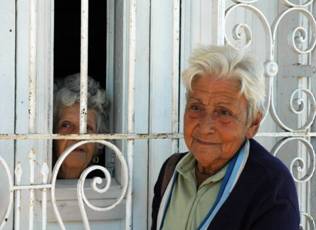
The economic crisis affecting many countries in the world, is reflected in great detail by the press, radio and television in Cuba. There is an abundance of media dedicated to it. Demonstrations and protests in opposition to many of the measures that some governments have been forced to implement to try to alleviate and restore a healthy economy are also shown in different media, both day and night, and even re-broadcast.
It is right that governments take steps to resolve the current situation, what’s more, it is a duty, as it also is, if it affects the citizens, for them to speak out against them. So democracy works. Many of the measures applied, where there is no other alternative, mean reduction of social services, wages, pensions, etc., and higher taxes and, therefore, are not popular. This has happened and is happening, for example, in Ireland, Portugal, Greece, Spain and other European Union countries where the crisis has been felt with great force. Regularly, these crises are used by political parties and organizations to proselytize and win converts.
However, it is noteworthy that about the protracted economic crisis in Cuba, the press, the radio and the television say absolutely nothing, and do not repeat the information official. It is no secret that many of the adjustment measures (this is called updating the model) recently implemented, are not popular.
These include: the downsizing and laying off workers, the steady rise in prices of staples and luxury goods, closing the workers’ cafeterias, the elimination of so-called gratuities and bonuses either in money or products (such as soap and detergent, that compensated somewhat for the low wages) and others.
Any of these measures in a democratic country, would be grounds for protests, demonstrations and even strikes. This does not happen, because all these acts are prohibited and are repressed and their perpetrators punished, if they dare to do them, under the premise that they threaten state security or that they are promoted by the enemy.
Perhaps that’s why people get the impression that nothing happens, and that all citizens are in agreement that they should mercilessly tighten their belts. The reality is not so simple: the protest passed through the majority of Cubans and society, but the media does not deal with it in its deep economic commentary.
To ignore a real problem does not mean that it doesn’t exist. It is also extremely dangerous: the pressure builds and when there is no outlet it tends to explode and the consequences are unpredictable. There are many examples.
It would be healthy for our media, so concerned about the crises of others,to be more concerned about ours, and to devote to them the attention and space they deserve. We would all gain from this and, perhaps, if the authorities also put aside their dogmas, schematics, stubbornness, intolerance and ideological entrenchments, that hinder and weigh down all the activities and prevent the free development of citizens’ initiatives, perhaps we could start to emerge from the crisis.
July 29 2012
